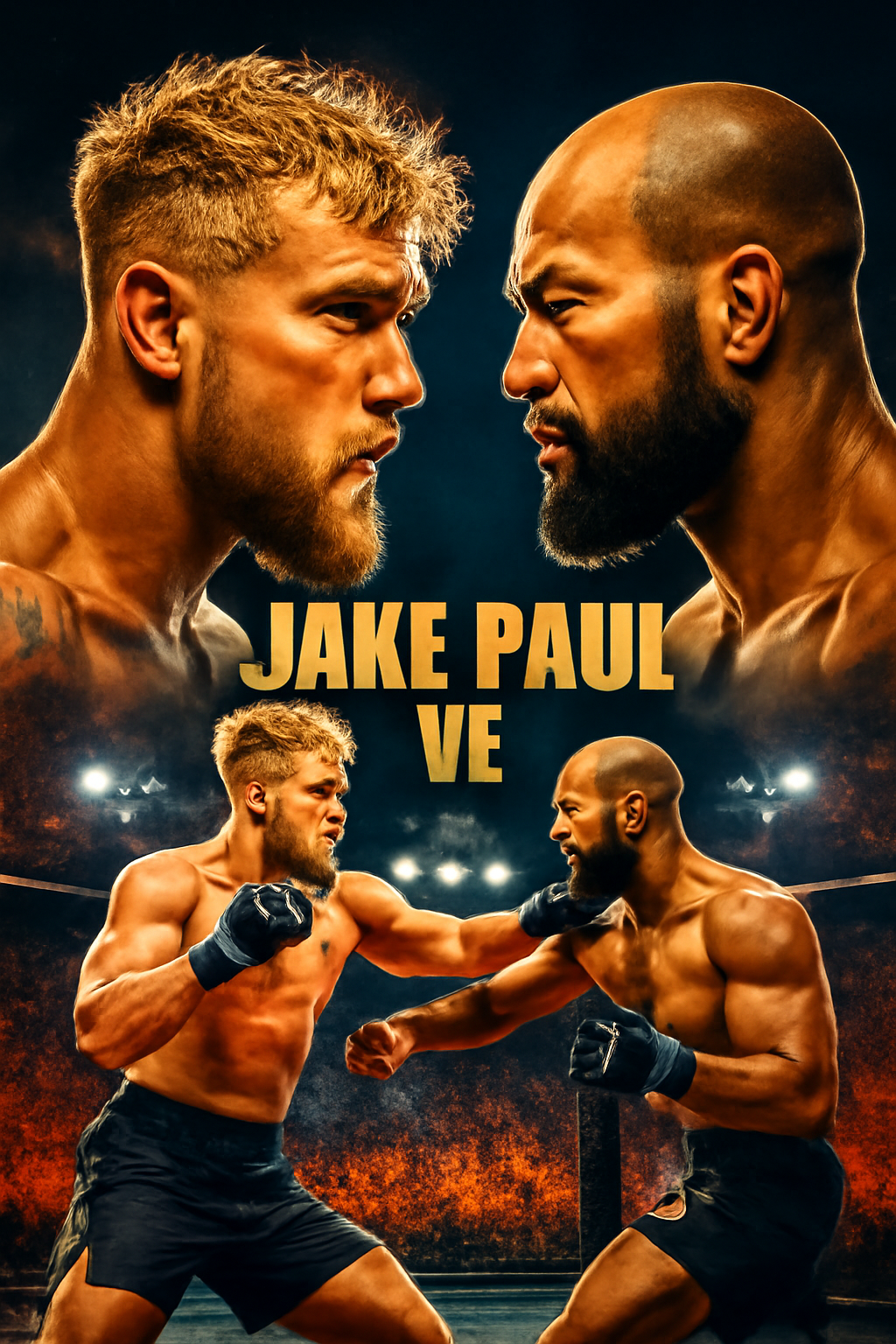Jake Paul, UFC, and the Circus of Combat Sports: Is This the Future of Fighting?
Jake Paul’s crossover into UFC blurs the line between sport and spectacle. Is combat sports evolving into a media circus, or is this the bold future fans can’t resist?

Introduction: Welcome to the Combat Sports Circus
Once upon a time, combat sports were built on grit, discipline, and blood-soaked tradition. Boxers climbed the ranks through local gyms, and UFC fighters clawed their way up from brutal undercards to title fights. But in 2025, the script looks very different.
Enter Jake Paul the YouTube star turned professional boxer turned promoter who has dragged combat sports into a new arena where spectacle, clout, and social media matter as much as technical skill. Add the UFC’s evolving business model, influencer boxing leagues, and the blurring line between sports and entertainment, and you get one question: Is this the future of fighting?

Jake Paul: The Disruptor Nobody Saw Coming
Jake Paul is polarizing. To boxing purists, he’s a clown exploiting the sport. To his fans, he’s a visionary who reinvented how fights are marketed.
- Origins: Jake Paul started in YouTube entertainment, pranks, and vlogs.
- Shift: By 2018, he entered boxing, first dismissed as a gimmick.
- Breakthrough: Wins against former MMA fighters like Ben Askren, Tyron Woodley, and Anderson Silva made headlines.
- Legacy-in-the-making: Love him or hate him, Paul has forced traditional combat sports promoters to rethink business.
He sells fights not through rankings or belts but through narratives, rivalries, and viral hype.
The UFC Factor: Entertainment Over Athletics
While boxing has struggled with fractured promotions and pay-per-view decline, the UFC under Dana White embraced spectacle early.
- Fighters are sold as characters trash talk, rivalries, and hype cycles drive viewership.
- UFC controls its talent pool, creating storylines like a TV series.
- Press conferences are as much entertainment as the fights themselves.
But fighters’ growing complaints about low pay and lack of creative freedom leave cracks. This vacuum allowed outsiders like Jake Paul to enter, offering fighters higher purses and more creative control in crossover events.
The Circus Element: Why Fans Are Hooked
Combat sports today look less like pure competition and more like event culture. The formula works because:
- Trash Talk → Viral Clips
Jake Paul, Conor McGregor, and others know drama sells. - Spectacle → Ticket Sales
Undercards now include influencers, celebrities, and even retired legends. - Memes → Marketing
Social media magnifies every knockout, every insult, every controversy. - Crossover Appeal → Wider Audience
Non-sports fans tune in for celebrity names.
This circus element is profitable, viral, and addictive.
Table: Traditional Combat Sports vs. The New Circus Model
| Aspect | Traditional Combat Sports | Circus Combat Sports (Jake Paul Era) |
|---|---|---|
| Path to Stardom | Amateur gyms, years of fights, ranking climbs | Social media clout, viral fame, quick crossover |
| Marketing | Fight posters, sports channels | TikTok clips, YouTube beef, meme-driven campaigns |
| Fighter Pay | Often low, promoter-heavy cut | Inflated purses, sponsorship-heavy, influencer deals |
| Audience | Hardcore fight fans | Casual viewers + influencer/celebrity fan bases |
| Event Atmosphere | Traditional arenas, purist commentary | Circus-like: concerts, celebrity hosts, drama shows |
| Legacy | Championships, Hall of Fame | Viral moments, pay-per-view numbers, media headlines |
The Jake Paul Playbook
Jake Paul didn’t just fight he rewrote the fight business model. Here’s his blueprint:
- Pick Opponents Smartly: Ex-MMA fighters with name value but declining skills.
- Build Narrative: Trash talk, personal feuds, “proving doubters wrong.”
- Leverage Social Media: Promote through Twitter beefs, TikTok memes, and YouTube callouts.
- Control Production: Launching “Most Valuable Promotions” gave him control over matchmaking, branding, and revenue.
- Diversify: Partnering with boxing’s sanctioning bodies while also running influencer undercards.
Result? Paul isn’t just a fighter he’s a self-sustained fight ecosystem.

UFC vs. Jake Paul: The Brewing War
Dana White and Jake Paul have clashed repeatedly. White mocks Paul’s credibility; Paul accuses UFC of underpaying fighters. But this rivalry spotlights the changing economics of combat sports.
- Fighter Exodus? UFC fighters like Francis Ngannou left the UFC for crossover boxing fights with much higher paydays.
- Control vs. Freedom: UFC holds strict contracts, but Paul offers fighters revenue splits.
- Audience Shifts: Younger fans, raised on YouTube and TikTok, resonate with Paul’s antics more than UFC’s old-school pressers.
This war is less about fighting skill and more about who controls combat sports culture.
The Critics: “It’s Not Real Fighting”
Traditionalists argue:
- Celebrity boxing waters down the sport’s integrity.
- Real champions get overshadowed by influencers.
- Gimmicks risk turning combat sports into parody.
But history says otherwise:
- Muhammad Ali was as famous for his showmanship as his skills.
- Mike Tyson’s fights were often short but built on pre-fight hype.
- Wrestling blurred real combat with entertainment decades ago.
The “circus” has always existed today’s version just has TikTok filters.
The Business Behind the Circus
Combat sports are as much business as athletics. Jake Paul understands this deeply.
Revenue Streams in Modern Combat Sports:
- Pay-Per-View (PPV): Still the crown jewel, but now marketed through social media hype.
- Sponsorships: Energy drinks, crypto brands, clothing labels—celebrity fights attract advertisers.
- Streaming Deals: DAZN, ESPN+, and YouTube pay to host viral fights.
- Merchandise: Fight-branded hoodies, gloves, and NFTs.
This diversified revenue model makes even mid-tier circus fights financially viable.
Is This Sustainable?
The circus model has momentum, but can it last?
Challenges:
- Oversaturation of influencer fights could bore fans.
- Poor-quality fights risk losing credibility.
- Hardcore fans may abandon circus events altogether.
Advantages:
- Younger audiences are loyal to entertainment-first sports.
- The blend of celebrity + sport creates infinite crossover opportunities.
- Fighters benefit from higher payouts and creative freedom.
The balance lies in blending spectacle with real skill.
The Future: Combat Sports as Event Culture
Looking ahead, the circus might evolve into a hybrid model:
- Tier 1: Traditional fighters chasing belts and legacy.
- Tier 2: Celebrity/influencer events that bring in new audiences.
- Tier 3: Crossovers where stars from both sides collide.
Combat sports won’t die it will fragment. Hardcore purists will still follow technical fights, but casual fans will flock to the circus. Both can coexist, each fueling the other.
Fan Reactions: Love It or Hate It

Fans are divided:
- Pro-Circus Fans:
“It’s entertaining, it’s fun, I get more value than a boring 12-round decision.” - Anti-Circus Fans:
“It’s ruining boxing’s legacy, clown fights overshadow real champions.”
But there’s one common truth: everyone talks about it. And in the attention economy, that’s the only scorecard that matters.
Conclusion: Fighting on Two Fronts
Jake Paul, UFC, and the circus of combat sports represent a cultural turning point. The old guard clings to tradition, while the new wave thrives on hype, memes, and viral chaos.
The future of fighting isn’t a single path it’s a duel between legacy and spectacle.
Jake Paul may not be the best fighter, but he’s arguably the most influential disruptor combat sports has seen in decades. Whether fans cheer or boo, the circus is here and it may just be the new main event.




